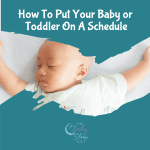
One of the questions we hear pretty frequently from moms and dads who have newborns and young infants at home is, “How can I get my baby on some kind of schedule?” In fact, the sample sleep and feeding schedules by age are some of the most popular pages on our site!
The problem is, most babies are not ready for strict, by-the-clock schedules until they are about 6 months old. Some babies are ready earlier than this, of course (some 3 month old babies are so predictable, you can set your watch by them!) And other babies will take longer to develop a consistent schedule. But 6 months is a good average.
This often leaves parents of newborns and young babies wondering how they can bring some order and predictability to their babies’ days. No, newborns and young infants are not ready for rigid sleep and feeding schedules, but isn’t there some way to create a little bit of consistency in a young baby’s day?
The answer is yes, there is. Creating what we call “fixed points” in your baby’s day is a gentle way to provide some structure and routine, which in turn can help promote better sleep for your baby.
What Are Fixed Points?
Fixed points are parts of your baby’s daily routines that happen at roughly the same time each day. Note the ‘roughly’ there — these are not strictly clock-based! However, a fixed point should happen at about the same time (give or take up to 20 or 30 minutes) from day to day.
How to Create Fixed Points In Your Baby’s Day
A great way to start establishing fixed points is to start with your baby’s morning wake-up time. This strategy works well for all babies, actually, regardless of age — and it works for toddlers, too! The idea here is that you make sure your baby (or toddler) wakes up at approximately the same time each morning. If your baby (or toddler) has a consistent wake-up time, it will go a long way towards creating consistency in the rest of the day’s activities.
The next fixed point that many parents choose to work on is a consistent bedtime. Keep in mind that bedtime looks different for a newborn than it does for a 4 or 5 month old baby. Since a newborn’s sleep cycles are driven by feedings, and since newborns tend to wake every few hours around the clock, regardless of whether it’s daytime or nighttime, most newborns don’t really have a clear bedtime. However, by 3 or 4 months, most babies are sleeping longer stretches (and feeding less) at night. At this point, you can begin to carve out a bedtime, and then work on consistently putting your baby to bed at this time. As with the morning wake-up, this fixed point works well for both babies and toddlers.
Naptime can also be a fixed point in your baby’s schedule — specifically, the timing of the first-morning nap and the first-afternoon nap. When your baby is old enough to start eating solid food, you can also make meals fixed points in your baby’s daily schedule.
A Gentle Way To Create A Schedule
 Using the fixed point technique, you can begin create small amounts of order and consistency in your baby’s day, starting right away, in the newborn stage. Then, as your baby grows, you can slowly add in more and more fixed points, until a predictable schedule emerges.
Using the fixed point technique, you can begin create small amounts of order and consistency in your baby’s day, starting right away, in the newborn stage. Then, as your baby grows, you can slowly add in more and more fixed points, until a predictable schedule emerges.
There’s a lot more we could say about fixed points, but we just don’t have room to do it in a blog article. Want more info about how to incorporate fixed points into your baby’s schedule? Check out our e-Book, Essential Keys to Your Newborn’s Sleep. It contains an entire chapter on schedules and sleep, which includes lots more details about fixed points, as well as a variety of sample daily sleep and feeding schedules (for both breastfed and formula-fed babies).
What are your baby’s ‘fixed points’?
Need help in creating a schedule that will maximize your baby or toddler’s sleep? Please be sure to pick up your FREE copy of 5 (tear-free) Ways to Help Your Child Sleep Through the Night, our e-Book with tear-free tips to help your baby sleep better. For those persistent nighttime struggles, check out The 3-Step System to Help Your Baby Sleep (babies) or The 5-Step System to Better Toddler Sleep (toddlers). Using a unique approach and practical tools for success, our e-books help you and your baby sleep through the night and nap better. Have a newborn at home? Download our free guide on newborn sleep, 15 Baby Sleep Facts New Parents Need To Know, or purchase a copy of our comprehensive e-Book on newborn sleep, Essential Keys to Your Newborn’s Sleep.








